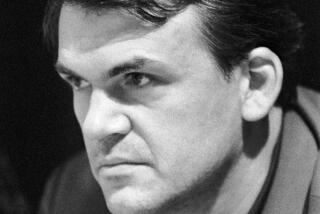Demolishing Deconstruction Brings More Debate
- Share via
I continue to be chastised for questioning the validity and value of a vogue form of literary criticism known as deconstruction.
I do not understand deconstruction, as I admitted; but I infer, from what I have read, that it reduces texts to ambiguity or meaninglessness. In the end, the word is master of the man.
It was born in France, but now seems to be entrenched in American higher education, especially at UC Irvine and Occidental College.
I have already quoted John Rowe, of the Critical Theory Institute at Irvine, who complained that as a journalist I am no more able to understand deconstruction than to understand atomic physics or perform laser surgery. Quite correct.
Similar complaints, though more acerbic, have come from Michael R. Near, assistant professor of English, and Daniel D. Fineman, associate professor of English and comparative literary studies, both of Occidental.
Having had my say, I owe my critics a hearing. I hope my necessarily brief summaries reflect fairly the tone and content of their protests.
Near’s is long and detailed. First, he says that my ignorance makes it hard to take me seriously. But he notes that I would not scorn an astrophysicist because he could not explain his work to me in a few simple words. “I am therefore curious that you would feel no compunction about leveling your scorn at language specialists who could not reduce to a few simple terms the intricacies of deconstruction.”
He said my column was “childish, intellectually irresponsible, and ideologically dangerous,” and perpetuated “the long anti-intellectual tradition that values the obvious and eschews the difficult enterprise of critical thinking. . . . And you do it in such an engaging style that we can barely detect the ideological rot that serves as the foundation for your discussion. . . .”
(That’s not as bad as comparing me to Hitler and Stalin, as another critic did.)
Prof. Fineman, like Near and Rowe, said that I simply do not have the education to understand deconstruction. He notes that he has spent 15 years trying to read Jacques Derrida, its high priest. “His work is very difficult because it relies on an in-depth knowledge of Western philosophy from Parmenides to Husserl, a set of theoretical gambits that are at odds with those implicit in this same Western culture, a use of language that is intentionally metaphoric, and no desire to lower his rhetorical or discursive ‘level’ to please an audience which has not done its ‘homework.’ ”
As if that were not enough to shut me out, he notes that deconstruction can be thought of as “a humanistic replication of Kurt Godel’s Incompleteness Theorem of 1931.” (I admit I am not familiar with that theorem.)
“Now Godel was one of the great mathematicians of the 20th Century, and his work in foundations and meta-mathematics is universally respected by those who can understand it. Nonetheless, I suspect that if you ‘knock at (his) door,’ you will also find no one who speaks your particularly impoverished version of English.”
I admit my ignorance. I am even more ignorant than the person who wrote the following plaintive letter, asking to remain anonymous:
“Your essay was a shot in the arm. I am a candidate for an M.A. in English. For several years now, I have been struggling to understand deconstruction. As of today, I still haven’t a clue as to what it is about. I have been made to feel inadequate by certain . . . professors because I wasn’t able to gush over this new phenomenon or use its jargon. . . . I am a humble high school English teacher. The flatulent, self-conscious and pompous deconstruction essays are the very antithesis of what I have been teaching my students about writing. . . .”
And this one, also anonymous, from a graduate student in the humanities at UCI, where Derrida is in residence:
“As a rule, the faculty worships the ground (Derrida) walks on. Your article . . . only expresses the tip of the iceberg. The real tragedy is the salaries, perks, grad student favors, secretarial help and free conference time that these tenured ‘researchers’ receive while 27 million Americans are illiterate. . . .”
Have the deconstructionists improved the writing of one novelist or poet, or made literature any more readable? Does anyone outside the rarefied air of their ivory towers have the slightest idea what they’re talking about?
True, I don’t understand the physicists either, but at least they gave us the atom bomb.
More to Read
Sign up for our Book Club newsletter
Get the latest news, events and more from the Los Angeles Times Book Club, and help us get L.A. reading and talking.
You may occasionally receive promotional content from the Los Angeles Times.








